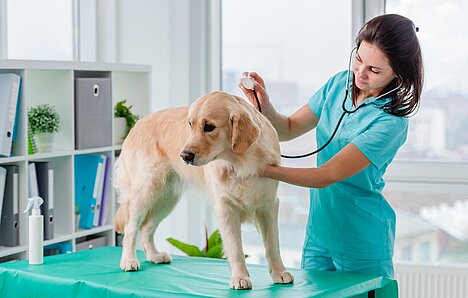Giardia

Giardia are tiny parasites that can infest the intestines of dogs. They cause diarrhea, vomiting and weight loss. Giardia is very contagious and can also be transmitted to humans. In this article you will learn how to recognize, treat and prevent Giardia in your dog.
How do you recognize Giardia in dogs?
Giardia usually causes a watery, slimy or bloody diarrhea that occurs several times a day. The feces may also smell bad. Your dog may also have a loss of appetite, vomiting, abdominal pain and fever. However, these symptoms can also have other causes, so it's important to see a vet if you notice them.
The vet can examine a sample of your dog's feces to detect Giardia. There are different tests that vary in sensitivity. Sometimes the fecal sample has to be tested several times to get a reliable result.
How is Giardia treated in dogs?
Giardia is treated with special medication prescribed by the vet. The treatment usually takes a week or longer. It is important to give the medication exactly as directed and not to stop the treatment, even if the symptoms disappear. Otherwise the Giardia may flare up again or develop resistance.
In addition to administering the medication, you should also pay attention to hygiene to prevent re-infection or transmission to other animals or humans. This includes
- Removing and disposing of your dog's droppings daily
- Cleaning your dog's bowl and toys regularly with hot water and disinfectant
- Wash or disinfect your dog's sleeping area frequently
- Wipe or bathe your dog thoroughly after every walk
- Wash your hands after every contact with your dog or its droppings
- Keep other pets and children away from your dog until he is cured
How can you prevent Giardia in dogs?
Giardia is widespread in the environment and can be transmitted through contaminated water, food or feces. To reduce the risk of infection, you should take the following measures:
- Only offer your dog fresh and clean water
- Do not feed your dog raw meat or offal
- Do not let your dog drink from puddles, ponds or rivers
- Keep your dog away from foreign feces
- Have your dog wormed regularly
- Have your dog tested annually for giardia
Giardia is not a life-threatening disease, but it can cause your dog a lot of discomfort. With an early diagnosis, consistent treatment and good hygiene, you can help your dog to recover quickly.
The authors assume that a veterinarian should be consulted if an animal is ill and that medication should only be taken after consultation with a doctor or pharmacist. Only an individual examination can lead to a diagnosis and treatment decision.
We help you find the nearest vet → This way